Project Management Methodologies and Theories: Challenges and Benefits
VerifiedAdded on 2022/11/25
|12
|3223
|492
Report
AI Summary
This report provides a comprehensive overview of project management methodologies, focusing on their application in contemporary global projects. It delves into three key methodologies: Waterfall, Agile, and PRINCE2, examining their distinct characteristics, processes, and suitability for different project scenarios. The report analyzes the challenges associated with each methodology, such as inferior quality in Waterfall, communication issues in Agile, and the need for analytical skills in PRINCE2, while also highlighting their respective benefits, including quick task completion in Waterfall, improved team morale and flexibility in Agile, and effective resource management in PRINCE2. Furthermore, the report identifies key success factors, including key performance indicators, comprehensive planning, and skilled personnel, that contribute to enhancing project management practices. The content aims to equip project managers with insights to select and implement the most appropriate methodology for optimal project outcomes.
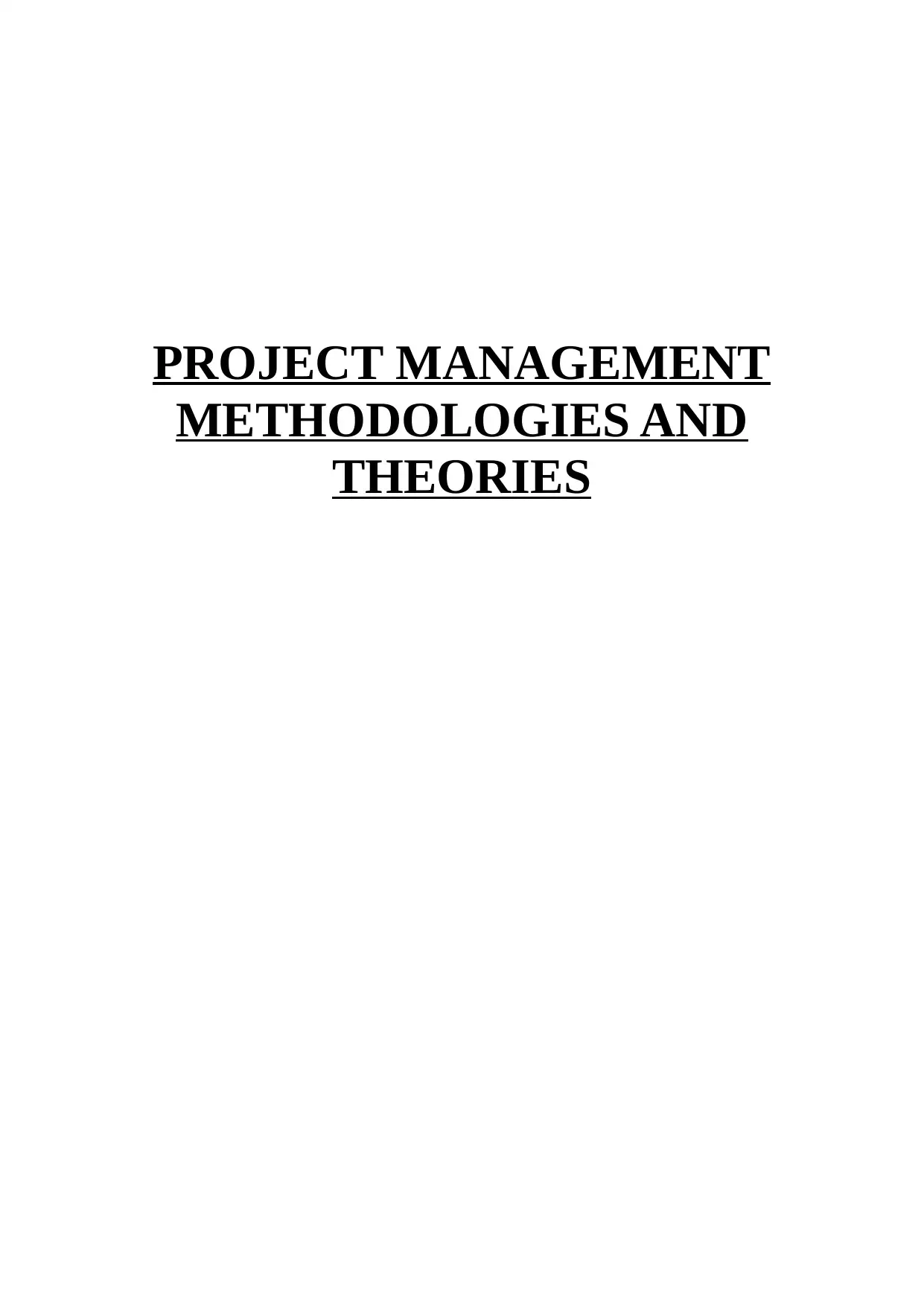
PROJECT MANAGEMENT
METHODOLOGIES AND
THEORIES
METHODOLOGIES AND
THEORIES
Paraphrase This Document
Need a fresh take? Get an instant paraphrase of this document with our AI Paraphraser

TABLE OF CONTENTS
INTRODUCTION..........................................................................................................................................3
Use of project management methodologies in contemporary global project.....................................3
Discuss challenges and benefits of these methodologies and bodies of knowledge...........................5
Examine the key success factors such as key performance indicators that helps in enhancing
practice..................................................................................................................................................8
CONCLUSION............................................................................................................................................10
INTRODUCTION..........................................................................................................................................3
Use of project management methodologies in contemporary global project.....................................3
Discuss challenges and benefits of these methodologies and bodies of knowledge...........................5
Examine the key success factors such as key performance indicators that helps in enhancing
practice..................................................................................................................................................8
CONCLUSION............................................................................................................................................10
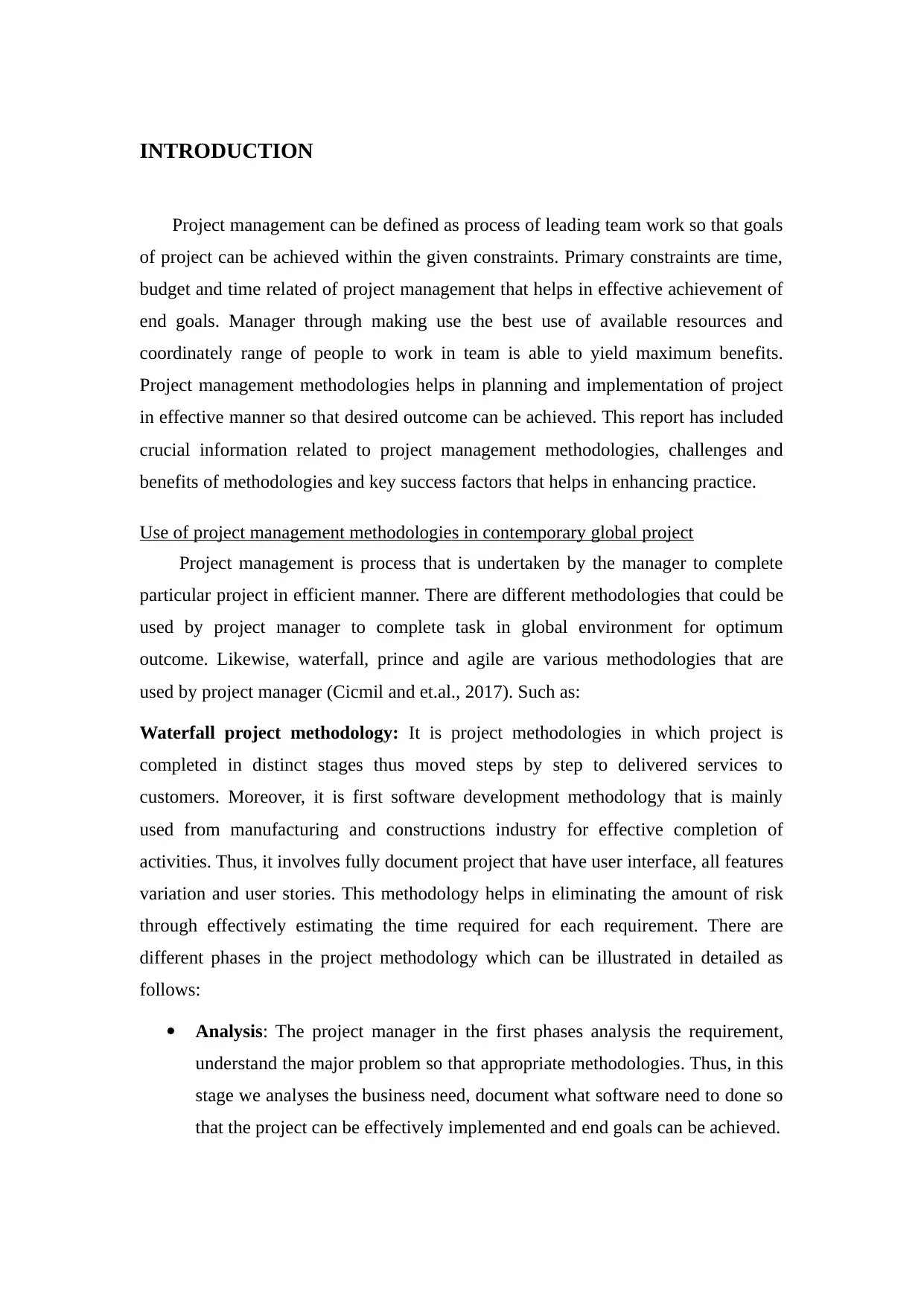
INTRODUCTION
Project management can be defined as process of leading team work so that goals
of project can be achieved within the given constraints. Primary constraints are time,
budget and time related of project management that helps in effective achievement of
end goals. Manager through making use the best use of available resources and
coordinately range of people to work in team is able to yield maximum benefits.
Project management methodologies helps in planning and implementation of project
in effective manner so that desired outcome can be achieved. This report has included
crucial information related to project management methodologies, challenges and
benefits of methodologies and key success factors that helps in enhancing practice.
Use of project management methodologies in contemporary global project
Project management is process that is undertaken by the manager to complete
particular project in efficient manner. There are different methodologies that could be
used by project manager to complete task in global environment for optimum
outcome. Likewise, waterfall, prince and agile are various methodologies that are
used by project manager (Cicmil and et.al., 2017). Such as:
Waterfall project methodology: It is project methodologies in which project is
completed in distinct stages thus moved steps by step to delivered services to
customers. Moreover, it is first software development methodology that is mainly
used from manufacturing and constructions industry for effective completion of
activities. Thus, it involves fully document project that have user interface, all features
variation and user stories. This methodology helps in eliminating the amount of risk
through effectively estimating the time required for each requirement. There are
different phases in the project methodology which can be illustrated in detailed as
follows:
Analysis: The project manager in the first phases analysis the requirement,
understand the major problem so that appropriate methodologies. Thus, in this
stage we analyses the business need, document what software need to done so
that the project can be effectively implemented and end goals can be achieved.
Project management can be defined as process of leading team work so that goals
of project can be achieved within the given constraints. Primary constraints are time,
budget and time related of project management that helps in effective achievement of
end goals. Manager through making use the best use of available resources and
coordinately range of people to work in team is able to yield maximum benefits.
Project management methodologies helps in planning and implementation of project
in effective manner so that desired outcome can be achieved. This report has included
crucial information related to project management methodologies, challenges and
benefits of methodologies and key success factors that helps in enhancing practice.
Use of project management methodologies in contemporary global project
Project management is process that is undertaken by the manager to complete
particular project in efficient manner. There are different methodologies that could be
used by project manager to complete task in global environment for optimum
outcome. Likewise, waterfall, prince and agile are various methodologies that are
used by project manager (Cicmil and et.al., 2017). Such as:
Waterfall project methodology: It is project methodologies in which project is
completed in distinct stages thus moved steps by step to delivered services to
customers. Moreover, it is first software development methodology that is mainly
used from manufacturing and constructions industry for effective completion of
activities. Thus, it involves fully document project that have user interface, all features
variation and user stories. This methodology helps in eliminating the amount of risk
through effectively estimating the time required for each requirement. There are
different phases in the project methodology which can be illustrated in detailed as
follows:
Analysis: The project manager in the first phases analysis the requirement,
understand the major problem so that appropriate methodologies. Thus, in this
stage we analyses the business need, document what software need to done so
that the project can be effectively implemented and end goals can be achieved.
⊘ This is a preview!⊘
Do you want full access?
Subscribe today to unlock all pages.

Trusted by 1+ million students worldwide
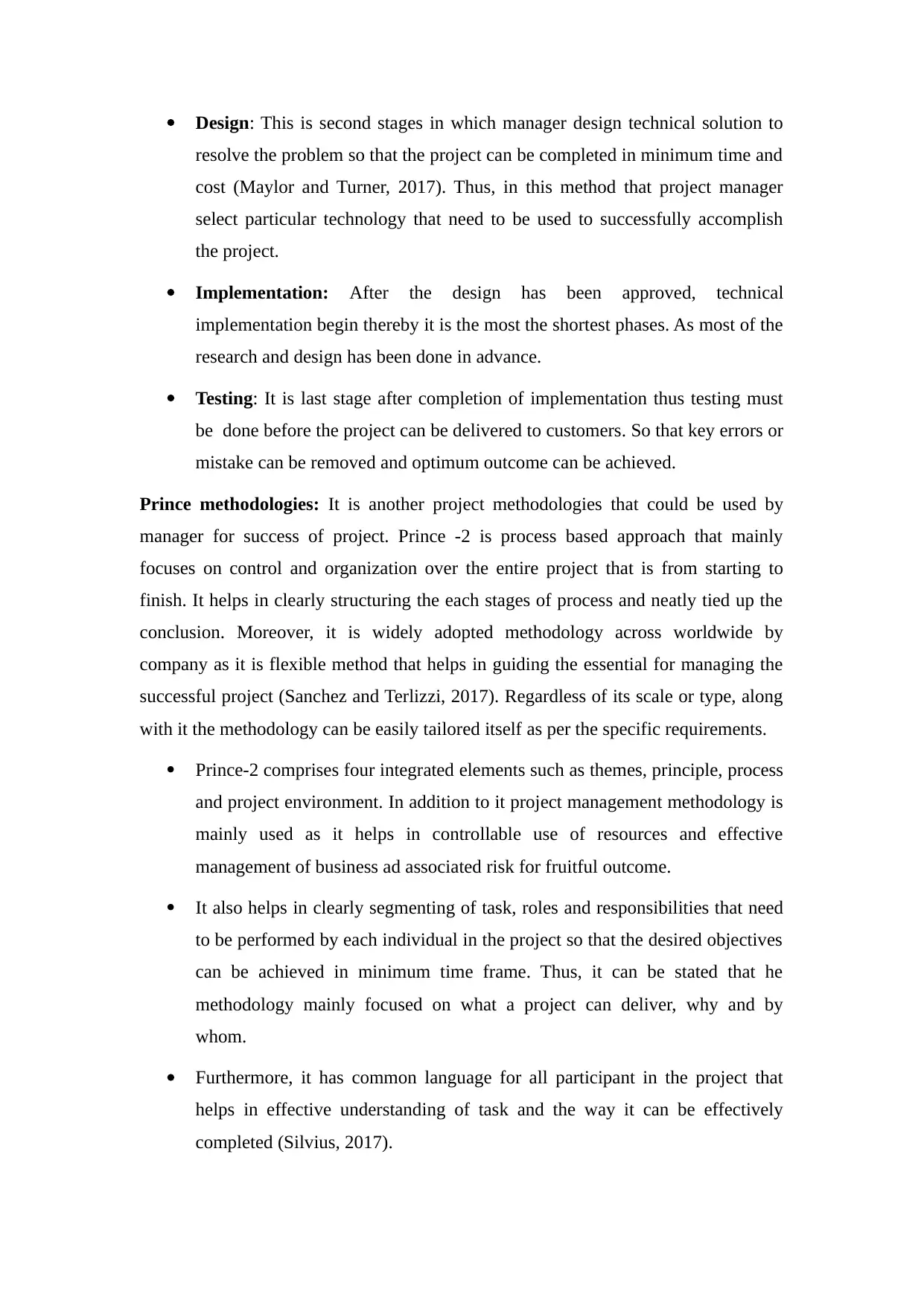
Design: This is second stages in which manager design technical solution to
resolve the problem so that the project can be completed in minimum time and
cost (Maylor and Turner, 2017). Thus, in this method that project manager
select particular technology that need to be used to successfully accomplish
the project.
Implementation: After the design has been approved, technical
implementation begin thereby it is the most the shortest phases. As most of the
research and design has been done in advance.
Testing: It is last stage after completion of implementation thus testing must
be done before the project can be delivered to customers. So that key errors or
mistake can be removed and optimum outcome can be achieved.
Prince methodologies: It is another project methodologies that could be used by
manager for success of project. Prince -2 is process based approach that mainly
focuses on control and organization over the entire project that is from starting to
finish. It helps in clearly structuring the each stages of process and neatly tied up the
conclusion. Moreover, it is widely adopted methodology across worldwide by
company as it is flexible method that helps in guiding the essential for managing the
successful project (Sanchez and Terlizzi, 2017). Regardless of its scale or type, along
with it the methodology can be easily tailored itself as per the specific requirements.
Prince-2 comprises four integrated elements such as themes, principle, process
and project environment. In addition to it project management methodology is
mainly used as it helps in controllable use of resources and effective
management of business ad associated risk for fruitful outcome.
It also helps in clearly segmenting of task, roles and responsibilities that need
to be performed by each individual in the project so that the desired objectives
can be achieved in minimum time frame. Thus, it can be stated that he
methodology mainly focused on what a project can deliver, why and by
whom.
Furthermore, it has common language for all participant in the project that
helps in effective understanding of task and the way it can be effectively
completed (Silvius, 2017).
resolve the problem so that the project can be completed in minimum time and
cost (Maylor and Turner, 2017). Thus, in this method that project manager
select particular technology that need to be used to successfully accomplish
the project.
Implementation: After the design has been approved, technical
implementation begin thereby it is the most the shortest phases. As most of the
research and design has been done in advance.
Testing: It is last stage after completion of implementation thus testing must
be done before the project can be delivered to customers. So that key errors or
mistake can be removed and optimum outcome can be achieved.
Prince methodologies: It is another project methodologies that could be used by
manager for success of project. Prince -2 is process based approach that mainly
focuses on control and organization over the entire project that is from starting to
finish. It helps in clearly structuring the each stages of process and neatly tied up the
conclusion. Moreover, it is widely adopted methodology across worldwide by
company as it is flexible method that helps in guiding the essential for managing the
successful project (Sanchez and Terlizzi, 2017). Regardless of its scale or type, along
with it the methodology can be easily tailored itself as per the specific requirements.
Prince-2 comprises four integrated elements such as themes, principle, process
and project environment. In addition to it project management methodology is
mainly used as it helps in controllable use of resources and effective
management of business ad associated risk for fruitful outcome.
It also helps in clearly segmenting of task, roles and responsibilities that need
to be performed by each individual in the project so that the desired objectives
can be achieved in minimum time frame. Thus, it can be stated that he
methodology mainly focused on what a project can deliver, why and by
whom.
Furthermore, it has common language for all participant in the project that
helps in effective understanding of task and the way it can be effectively
completed (Silvius, 2017).
Paraphrase This Document
Need a fresh take? Get an instant paraphrase of this document with our AI Paraphraser
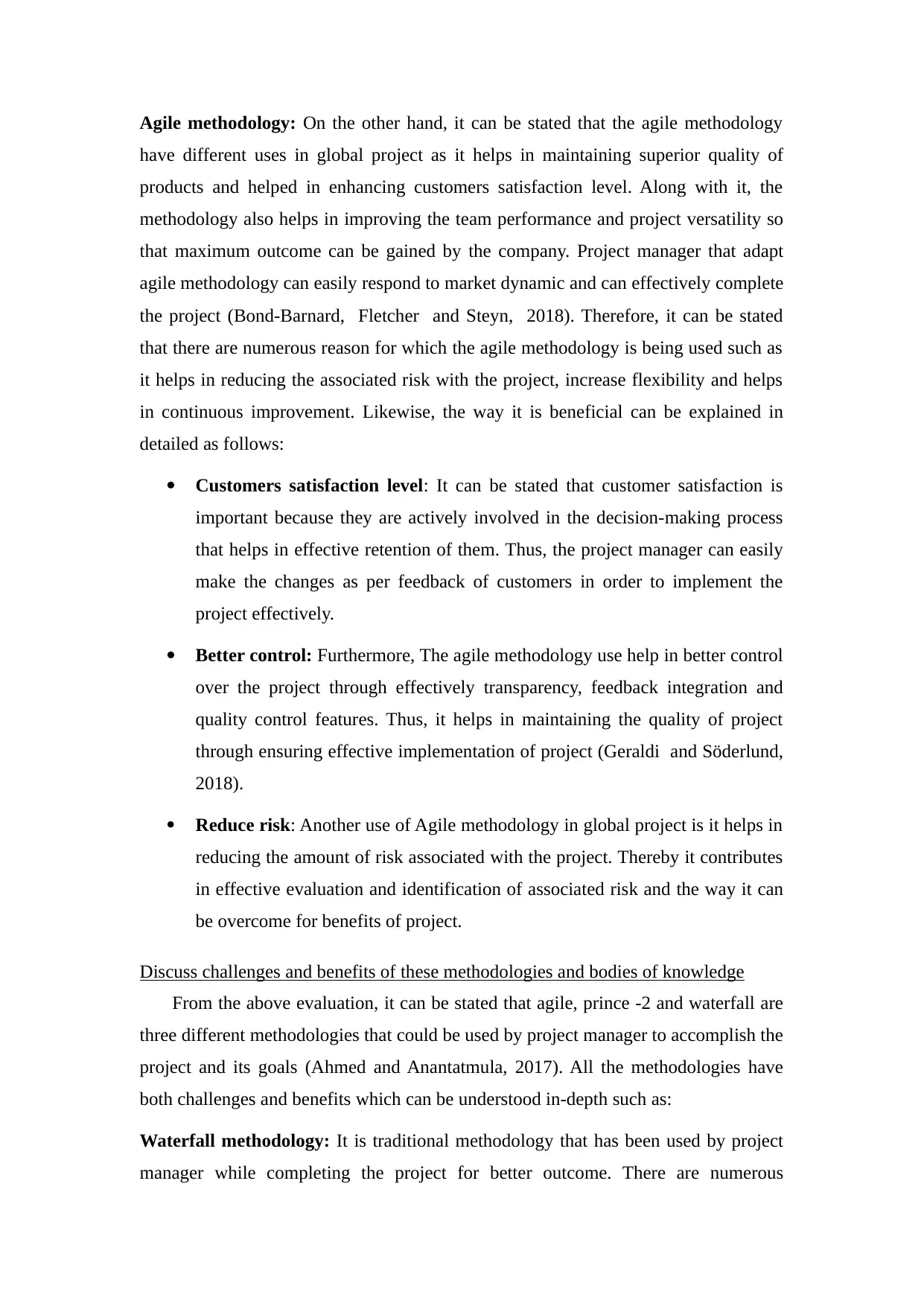
Agile methodology: On the other hand, it can be stated that the agile methodology
have different uses in global project as it helps in maintaining superior quality of
products and helped in enhancing customers satisfaction level. Along with it, the
methodology also helps in improving the team performance and project versatility so
that maximum outcome can be gained by the company. Project manager that adapt
agile methodology can easily respond to market dynamic and can effectively complete
the project (Bond-Barnard, Fletcher and Steyn, 2018). Therefore, it can be stated
that there are numerous reason for which the agile methodology is being used such as
it helps in reducing the associated risk with the project, increase flexibility and helps
in continuous improvement. Likewise, the way it is beneficial can be explained in
detailed as follows:
Customers satisfaction level: It can be stated that customer satisfaction is
important because they are actively involved in the decision-making process
that helps in effective retention of them. Thus, the project manager can easily
make the changes as per feedback of customers in order to implement the
project effectively.
Better control: Furthermore, The agile methodology use help in better control
over the project through effectively transparency, feedback integration and
quality control features. Thus, it helps in maintaining the quality of project
through ensuring effective implementation of project (Geraldi and Söderlund,
2018).
Reduce risk: Another use of Agile methodology in global project is it helps in
reducing the amount of risk associated with the project. Thereby it contributes
in effective evaluation and identification of associated risk and the way it can
be overcome for benefits of project.
Discuss challenges and benefits of these methodologies and bodies of knowledge
From the above evaluation, it can be stated that agile, prince -2 and waterfall are
three different methodologies that could be used by project manager to accomplish the
project and its goals (Ahmed and Anantatmula, 2017). All the methodologies have
both challenges and benefits which can be understood in-depth such as:
Waterfall methodology: It is traditional methodology that has been used by project
manager while completing the project for better outcome. There are numerous
have different uses in global project as it helps in maintaining superior quality of
products and helped in enhancing customers satisfaction level. Along with it, the
methodology also helps in improving the team performance and project versatility so
that maximum outcome can be gained by the company. Project manager that adapt
agile methodology can easily respond to market dynamic and can effectively complete
the project (Bond-Barnard, Fletcher and Steyn, 2018). Therefore, it can be stated
that there are numerous reason for which the agile methodology is being used such as
it helps in reducing the associated risk with the project, increase flexibility and helps
in continuous improvement. Likewise, the way it is beneficial can be explained in
detailed as follows:
Customers satisfaction level: It can be stated that customer satisfaction is
important because they are actively involved in the decision-making process
that helps in effective retention of them. Thus, the project manager can easily
make the changes as per feedback of customers in order to implement the
project effectively.
Better control: Furthermore, The agile methodology use help in better control
over the project through effectively transparency, feedback integration and
quality control features. Thus, it helps in maintaining the quality of project
through ensuring effective implementation of project (Geraldi and Söderlund,
2018).
Reduce risk: Another use of Agile methodology in global project is it helps in
reducing the amount of risk associated with the project. Thereby it contributes
in effective evaluation and identification of associated risk and the way it can
be overcome for benefits of project.
Discuss challenges and benefits of these methodologies and bodies of knowledge
From the above evaluation, it can be stated that agile, prince -2 and waterfall are
three different methodologies that could be used by project manager to accomplish the
project and its goals (Ahmed and Anantatmula, 2017). All the methodologies have
both challenges and benefits which can be understood in-depth such as:
Waterfall methodology: It is traditional methodology that has been used by project
manager while completing the project for better outcome. There are numerous
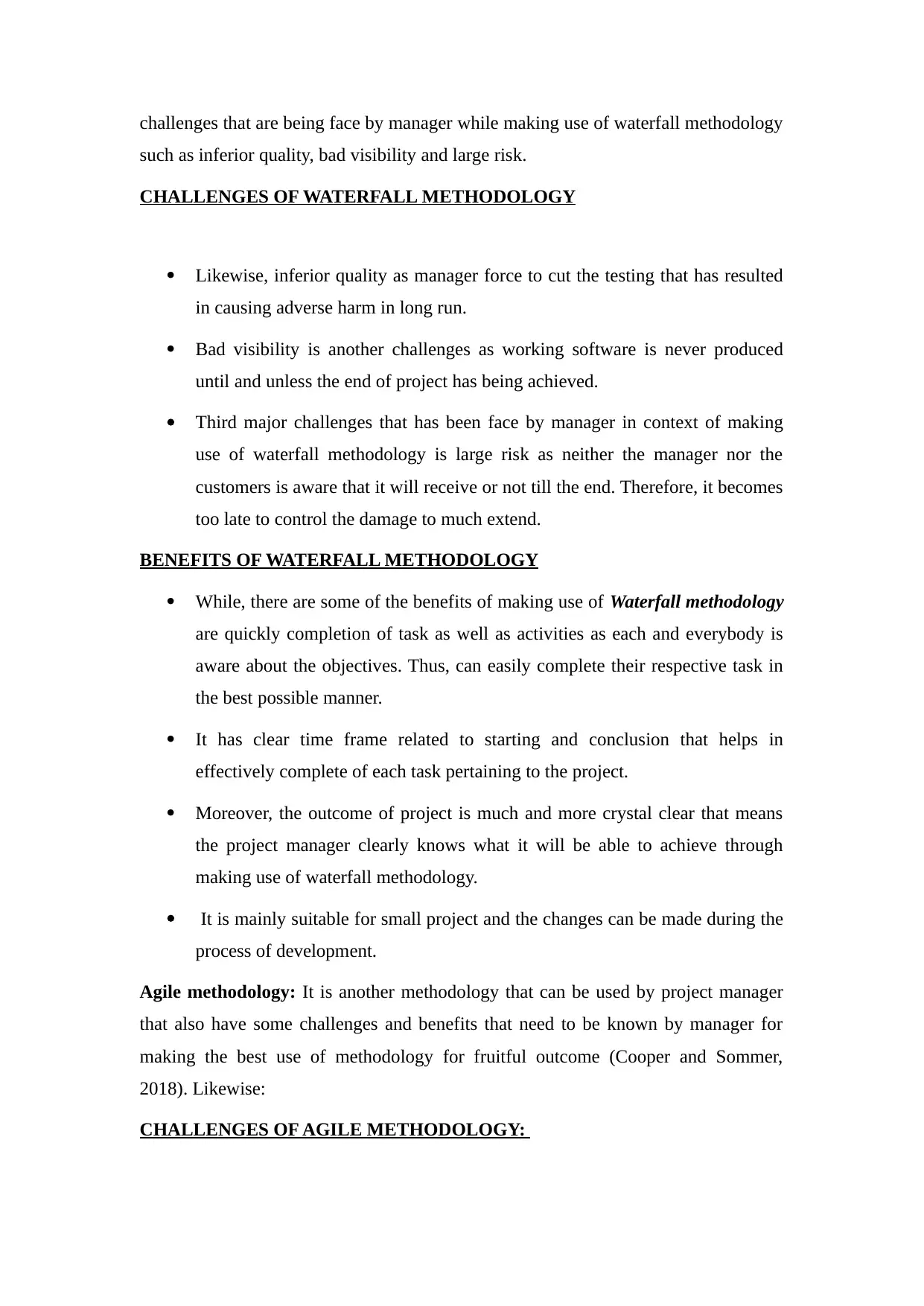
challenges that are being face by manager while making use of waterfall methodology
such as inferior quality, bad visibility and large risk.
CHALLENGES OF WATERFALL METHODOLOGY
Likewise, inferior quality as manager force to cut the testing that has resulted
in causing adverse harm in long run.
Bad visibility is another challenges as working software is never produced
until and unless the end of project has being achieved.
Third major challenges that has been face by manager in context of making
use of waterfall methodology is large risk as neither the manager nor the
customers is aware that it will receive or not till the end. Therefore, it becomes
too late to control the damage to much extend.
BENEFITS OF WATERFALL METHODOLOGY
While, there are some of the benefits of making use of Waterfall methodology
are quickly completion of task as well as activities as each and everybody is
aware about the objectives. Thus, can easily complete their respective task in
the best possible manner.
It has clear time frame related to starting and conclusion that helps in
effectively complete of each task pertaining to the project.
Moreover, the outcome of project is much and more crystal clear that means
the project manager clearly knows what it will be able to achieve through
making use of waterfall methodology.
It is mainly suitable for small project and the changes can be made during the
process of development.
Agile methodology: It is another methodology that can be used by project manager
that also have some challenges and benefits that need to be known by manager for
making the best use of methodology for fruitful outcome (Cooper and Sommer,
2018). Likewise:
CHALLENGES OF AGILE METHODOLOGY:
such as inferior quality, bad visibility and large risk.
CHALLENGES OF WATERFALL METHODOLOGY
Likewise, inferior quality as manager force to cut the testing that has resulted
in causing adverse harm in long run.
Bad visibility is another challenges as working software is never produced
until and unless the end of project has being achieved.
Third major challenges that has been face by manager in context of making
use of waterfall methodology is large risk as neither the manager nor the
customers is aware that it will receive or not till the end. Therefore, it becomes
too late to control the damage to much extend.
BENEFITS OF WATERFALL METHODOLOGY
While, there are some of the benefits of making use of Waterfall methodology
are quickly completion of task as well as activities as each and everybody is
aware about the objectives. Thus, can easily complete their respective task in
the best possible manner.
It has clear time frame related to starting and conclusion that helps in
effectively complete of each task pertaining to the project.
Moreover, the outcome of project is much and more crystal clear that means
the project manager clearly knows what it will be able to achieve through
making use of waterfall methodology.
It is mainly suitable for small project and the changes can be made during the
process of development.
Agile methodology: It is another methodology that can be used by project manager
that also have some challenges and benefits that need to be known by manager for
making the best use of methodology for fruitful outcome (Cooper and Sommer,
2018). Likewise:
CHALLENGES OF AGILE METHODOLOGY:
⊘ This is a preview!⊘
Do you want full access?
Subscribe today to unlock all pages.

Trusted by 1+ million students worldwide
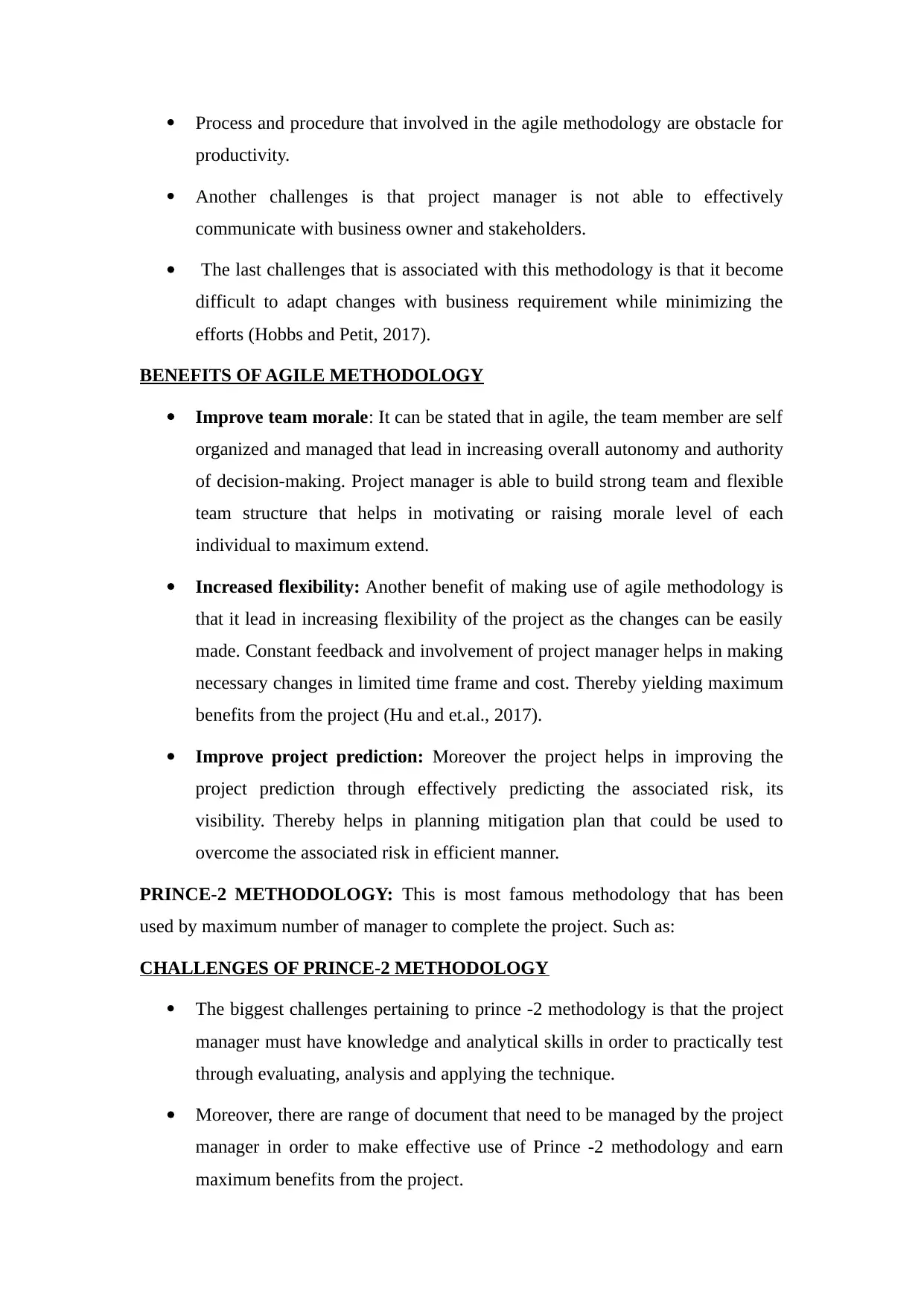
Process and procedure that involved in the agile methodology are obstacle for
productivity.
Another challenges is that project manager is not able to effectively
communicate with business owner and stakeholders.
The last challenges that is associated with this methodology is that it become
difficult to adapt changes with business requirement while minimizing the
efforts (Hobbs and Petit, 2017).
BENEFITS OF AGILE METHODOLOGY
Improve team morale: It can be stated that in agile, the team member are self
organized and managed that lead in increasing overall autonomy and authority
of decision-making. Project manager is able to build strong team and flexible
team structure that helps in motivating or raising morale level of each
individual to maximum extend.
Increased flexibility: Another benefit of making use of agile methodology is
that it lead in increasing flexibility of the project as the changes can be easily
made. Constant feedback and involvement of project manager helps in making
necessary changes in limited time frame and cost. Thereby yielding maximum
benefits from the project (Hu and et.al., 2017).
Improve project prediction: Moreover the project helps in improving the
project prediction through effectively predicting the associated risk, its
visibility. Thereby helps in planning mitigation plan that could be used to
overcome the associated risk in efficient manner.
PRINCE-2 METHODOLOGY: This is most famous methodology that has been
used by maximum number of manager to complete the project. Such as:
CHALLENGES OF PRINCE-2 METHODOLOGY
The biggest challenges pertaining to prince -2 methodology is that the project
manager must have knowledge and analytical skills in order to practically test
through evaluating, analysis and applying the technique.
Moreover, there are range of document that need to be managed by the project
manager in order to make effective use of Prince -2 methodology and earn
maximum benefits from the project.
productivity.
Another challenges is that project manager is not able to effectively
communicate with business owner and stakeholders.
The last challenges that is associated with this methodology is that it become
difficult to adapt changes with business requirement while minimizing the
efforts (Hobbs and Petit, 2017).
BENEFITS OF AGILE METHODOLOGY
Improve team morale: It can be stated that in agile, the team member are self
organized and managed that lead in increasing overall autonomy and authority
of decision-making. Project manager is able to build strong team and flexible
team structure that helps in motivating or raising morale level of each
individual to maximum extend.
Increased flexibility: Another benefit of making use of agile methodology is
that it lead in increasing flexibility of the project as the changes can be easily
made. Constant feedback and involvement of project manager helps in making
necessary changes in limited time frame and cost. Thereby yielding maximum
benefits from the project (Hu and et.al., 2017).
Improve project prediction: Moreover the project helps in improving the
project prediction through effectively predicting the associated risk, its
visibility. Thereby helps in planning mitigation plan that could be used to
overcome the associated risk in efficient manner.
PRINCE-2 METHODOLOGY: This is most famous methodology that has been
used by maximum number of manager to complete the project. Such as:
CHALLENGES OF PRINCE-2 METHODOLOGY
The biggest challenges pertaining to prince -2 methodology is that the project
manager must have knowledge and analytical skills in order to practically test
through evaluating, analysis and applying the technique.
Moreover, there are range of document that need to be managed by the project
manager in order to make effective use of Prince -2 methodology and earn
maximum benefits from the project.
Paraphrase This Document
Need a fresh take? Get an instant paraphrase of this document with our AI Paraphraser
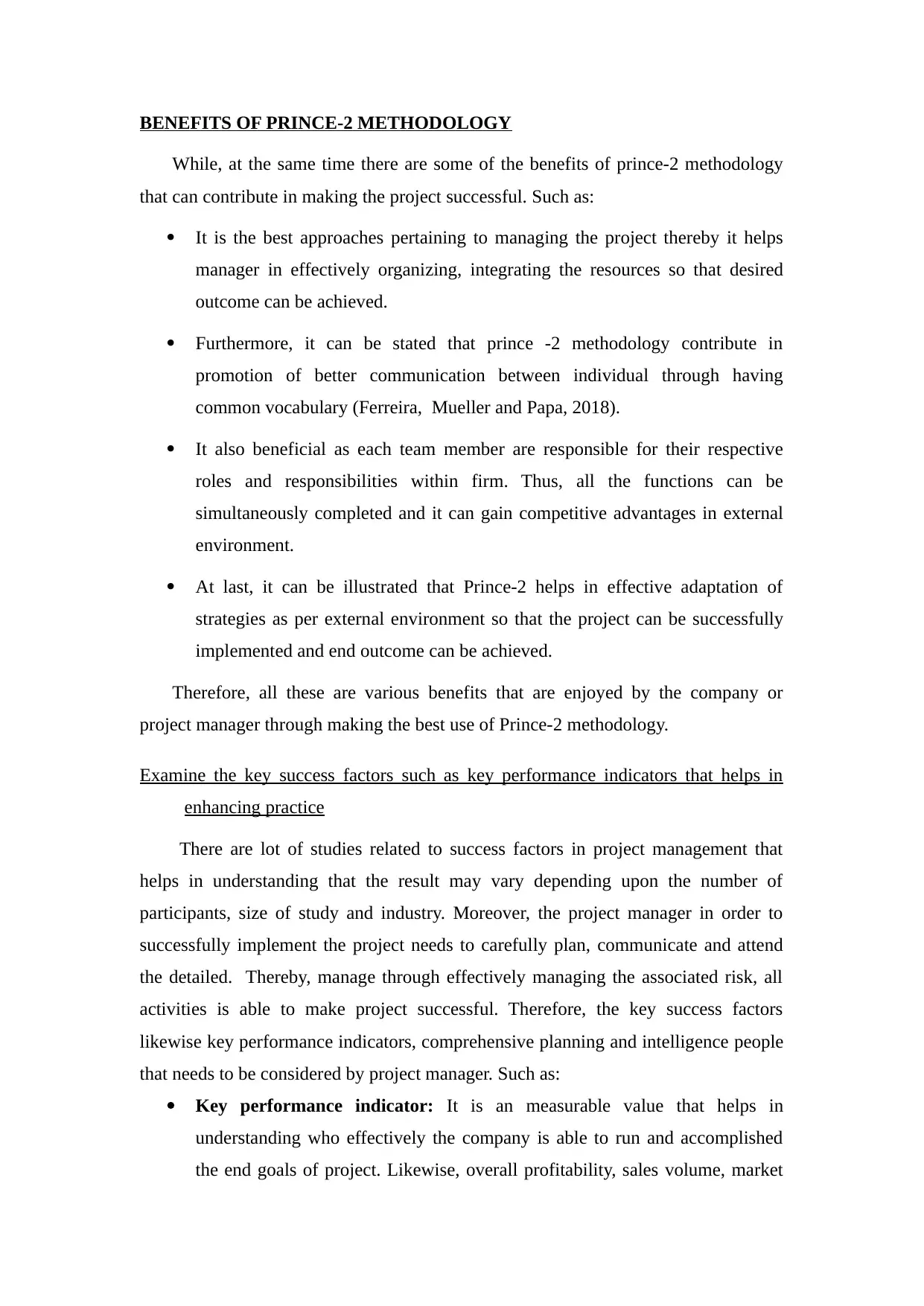
BENEFITS OF PRINCE-2 METHODOLOGY
While, at the same time there are some of the benefits of prince-2 methodology
that can contribute in making the project successful. Such as:
It is the best approaches pertaining to managing the project thereby it helps
manager in effectively organizing, integrating the resources so that desired
outcome can be achieved.
Furthermore, it can be stated that prince -2 methodology contribute in
promotion of better communication between individual through having
common vocabulary (Ferreira, Mueller and Papa, 2018).
It also beneficial as each team member are responsible for their respective
roles and responsibilities within firm. Thus, all the functions can be
simultaneously completed and it can gain competitive advantages in external
environment.
At last, it can be illustrated that Prince-2 helps in effective adaptation of
strategies as per external environment so that the project can be successfully
implemented and end outcome can be achieved.
Therefore, all these are various benefits that are enjoyed by the company or
project manager through making the best use of Prince-2 methodology.
Examine the key success factors such as key performance indicators that helps in
enhancing practice
There are lot of studies related to success factors in project management that
helps in understanding that the result may vary depending upon the number of
participants, size of study and industry. Moreover, the project manager in order to
successfully implement the project needs to carefully plan, communicate and attend
the detailed. Thereby, manage through effectively managing the associated risk, all
activities is able to make project successful. Therefore, the key success factors
likewise key performance indicators, comprehensive planning and intelligence people
that needs to be considered by project manager. Such as:
Key performance indicator: It is an measurable value that helps in
understanding who effectively the company is able to run and accomplished
the end goals of project. Likewise, overall profitability, sales volume, market
While, at the same time there are some of the benefits of prince-2 methodology
that can contribute in making the project successful. Such as:
It is the best approaches pertaining to managing the project thereby it helps
manager in effectively organizing, integrating the resources so that desired
outcome can be achieved.
Furthermore, it can be stated that prince -2 methodology contribute in
promotion of better communication between individual through having
common vocabulary (Ferreira, Mueller and Papa, 2018).
It also beneficial as each team member are responsible for their respective
roles and responsibilities within firm. Thus, all the functions can be
simultaneously completed and it can gain competitive advantages in external
environment.
At last, it can be illustrated that Prince-2 helps in effective adaptation of
strategies as per external environment so that the project can be successfully
implemented and end outcome can be achieved.
Therefore, all these are various benefits that are enjoyed by the company or
project manager through making the best use of Prince-2 methodology.
Examine the key success factors such as key performance indicators that helps in
enhancing practice
There are lot of studies related to success factors in project management that
helps in understanding that the result may vary depending upon the number of
participants, size of study and industry. Moreover, the project manager in order to
successfully implement the project needs to carefully plan, communicate and attend
the detailed. Thereby, manage through effectively managing the associated risk, all
activities is able to make project successful. Therefore, the key success factors
likewise key performance indicators, comprehensive planning and intelligence people
that needs to be considered by project manager. Such as:
Key performance indicator: It is an measurable value that helps in
understanding who effectively the company is able to run and accomplished
the end goals of project. Likewise, overall profitability, sales volume, market
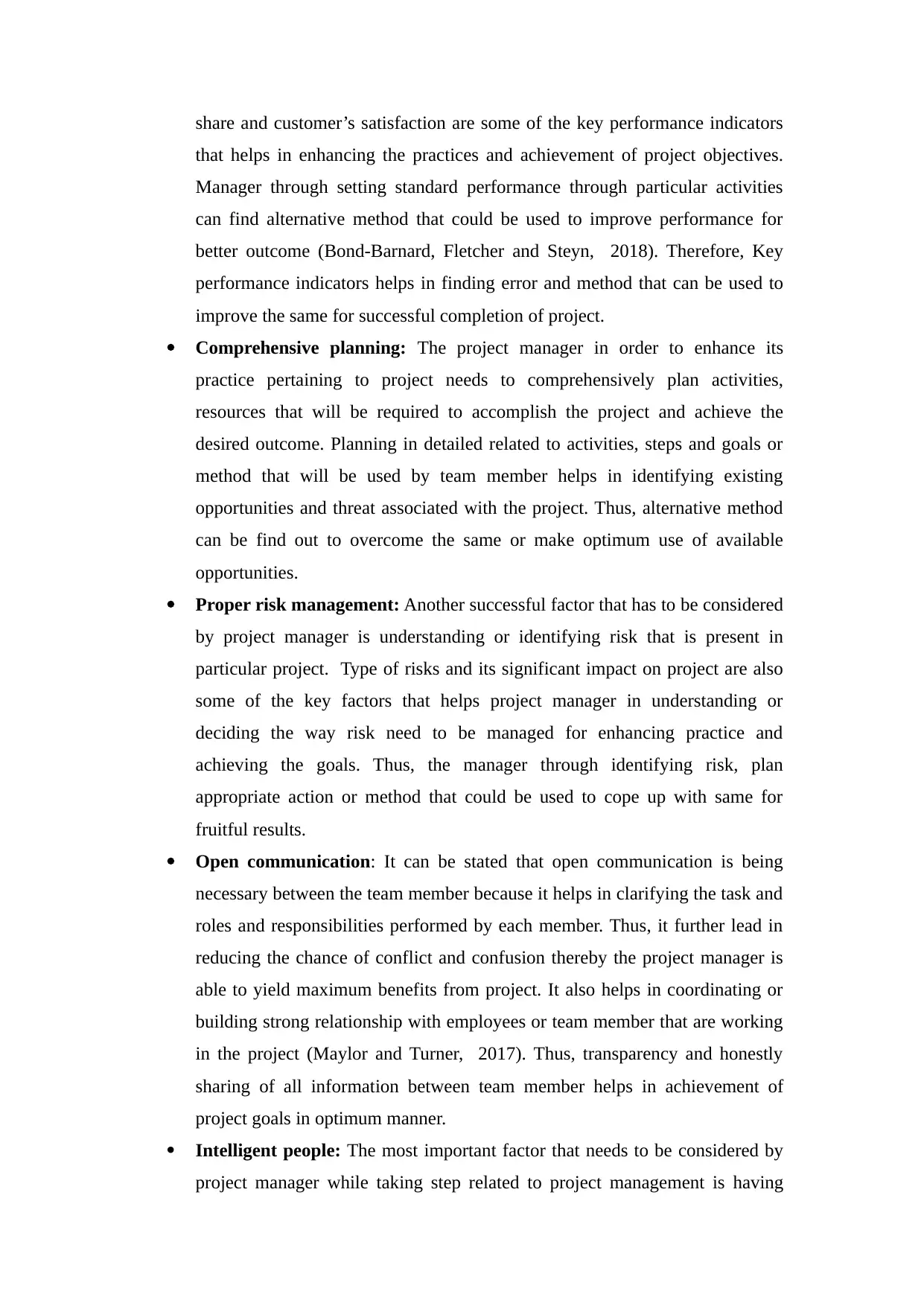
share and customer’s satisfaction are some of the key performance indicators
that helps in enhancing the practices and achievement of project objectives.
Manager through setting standard performance through particular activities
can find alternative method that could be used to improve performance for
better outcome (Bond-Barnard, Fletcher and Steyn, 2018). Therefore, Key
performance indicators helps in finding error and method that can be used to
improve the same for successful completion of project.
Comprehensive planning: The project manager in order to enhance its
practice pertaining to project needs to comprehensively plan activities,
resources that will be required to accomplish the project and achieve the
desired outcome. Planning in detailed related to activities, steps and goals or
method that will be used by team member helps in identifying existing
opportunities and threat associated with the project. Thus, alternative method
can be find out to overcome the same or make optimum use of available
opportunities.
Proper risk management: Another successful factor that has to be considered
by project manager is understanding or identifying risk that is present in
particular project. Type of risks and its significant impact on project are also
some of the key factors that helps project manager in understanding or
deciding the way risk need to be managed for enhancing practice and
achieving the goals. Thus, the manager through identifying risk, plan
appropriate action or method that could be used to cope up with same for
fruitful results.
Open communication: It can be stated that open communication is being
necessary between the team member because it helps in clarifying the task and
roles and responsibilities performed by each member. Thus, it further lead in
reducing the chance of conflict and confusion thereby the project manager is
able to yield maximum benefits from project. It also helps in coordinating or
building strong relationship with employees or team member that are working
in the project (Maylor and Turner, 2017). Thus, transparency and honestly
sharing of all information between team member helps in achievement of
project goals in optimum manner.
Intelligent people: The most important factor that needs to be considered by
project manager while taking step related to project management is having
that helps in enhancing the practices and achievement of project objectives.
Manager through setting standard performance through particular activities
can find alternative method that could be used to improve performance for
better outcome (Bond-Barnard, Fletcher and Steyn, 2018). Therefore, Key
performance indicators helps in finding error and method that can be used to
improve the same for successful completion of project.
Comprehensive planning: The project manager in order to enhance its
practice pertaining to project needs to comprehensively plan activities,
resources that will be required to accomplish the project and achieve the
desired outcome. Planning in detailed related to activities, steps and goals or
method that will be used by team member helps in identifying existing
opportunities and threat associated with the project. Thus, alternative method
can be find out to overcome the same or make optimum use of available
opportunities.
Proper risk management: Another successful factor that has to be considered
by project manager is understanding or identifying risk that is present in
particular project. Type of risks and its significant impact on project are also
some of the key factors that helps project manager in understanding or
deciding the way risk need to be managed for enhancing practice and
achieving the goals. Thus, the manager through identifying risk, plan
appropriate action or method that could be used to cope up with same for
fruitful results.
Open communication: It can be stated that open communication is being
necessary between the team member because it helps in clarifying the task and
roles and responsibilities performed by each member. Thus, it further lead in
reducing the chance of conflict and confusion thereby the project manager is
able to yield maximum benefits from project. It also helps in coordinating or
building strong relationship with employees or team member that are working
in the project (Maylor and Turner, 2017). Thus, transparency and honestly
sharing of all information between team member helps in achievement of
project goals in optimum manner.
Intelligent people: The most important factor that needs to be considered by
project manager while taking step related to project management is having
⊘ This is a preview!⊘
Do you want full access?
Subscribe today to unlock all pages.

Trusted by 1+ million students worldwide
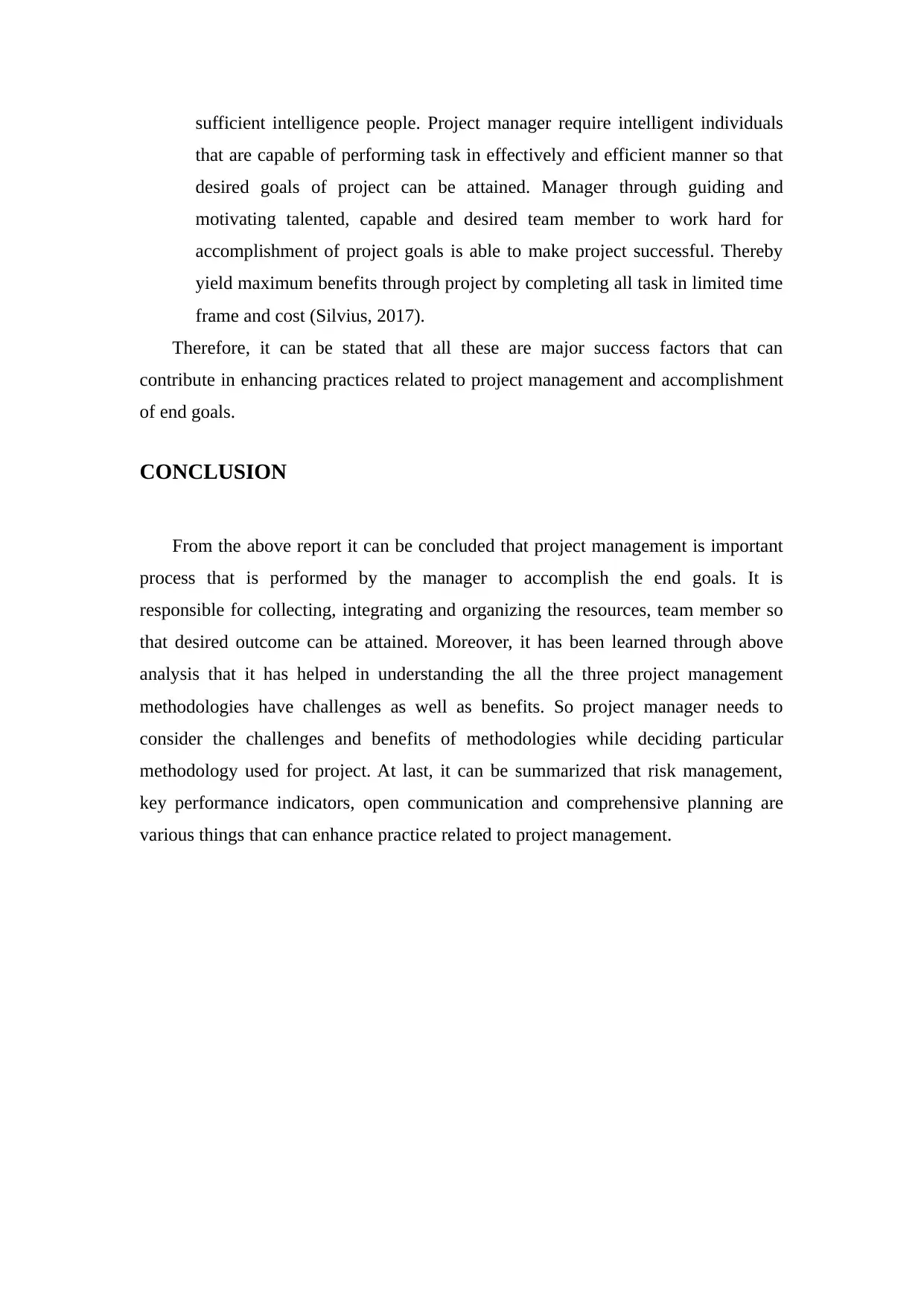
sufficient intelligence people. Project manager require intelligent individuals
that are capable of performing task in effectively and efficient manner so that
desired goals of project can be attained. Manager through guiding and
motivating talented, capable and desired team member to work hard for
accomplishment of project goals is able to make project successful. Thereby
yield maximum benefits through project by completing all task in limited time
frame and cost (Silvius, 2017).
Therefore, it can be stated that all these are major success factors that can
contribute in enhancing practices related to project management and accomplishment
of end goals.
CONCLUSION
From the above report it can be concluded that project management is important
process that is performed by the manager to accomplish the end goals. It is
responsible for collecting, integrating and organizing the resources, team member so
that desired outcome can be attained. Moreover, it has been learned through above
analysis that it has helped in understanding the all the three project management
methodologies have challenges as well as benefits. So project manager needs to
consider the challenges and benefits of methodologies while deciding particular
methodology used for project. At last, it can be summarized that risk management,
key performance indicators, open communication and comprehensive planning are
various things that can enhance practice related to project management.
that are capable of performing task in effectively and efficient manner so that
desired goals of project can be attained. Manager through guiding and
motivating talented, capable and desired team member to work hard for
accomplishment of project goals is able to make project successful. Thereby
yield maximum benefits through project by completing all task in limited time
frame and cost (Silvius, 2017).
Therefore, it can be stated that all these are major success factors that can
contribute in enhancing practices related to project management and accomplishment
of end goals.
CONCLUSION
From the above report it can be concluded that project management is important
process that is performed by the manager to accomplish the end goals. It is
responsible for collecting, integrating and organizing the resources, team member so
that desired outcome can be attained. Moreover, it has been learned through above
analysis that it has helped in understanding the all the three project management
methodologies have challenges as well as benefits. So project manager needs to
consider the challenges and benefits of methodologies while deciding particular
methodology used for project. At last, it can be summarized that risk management,
key performance indicators, open communication and comprehensive planning are
various things that can enhance practice related to project management.
Paraphrase This Document
Need a fresh take? Get an instant paraphrase of this document with our AI Paraphraser
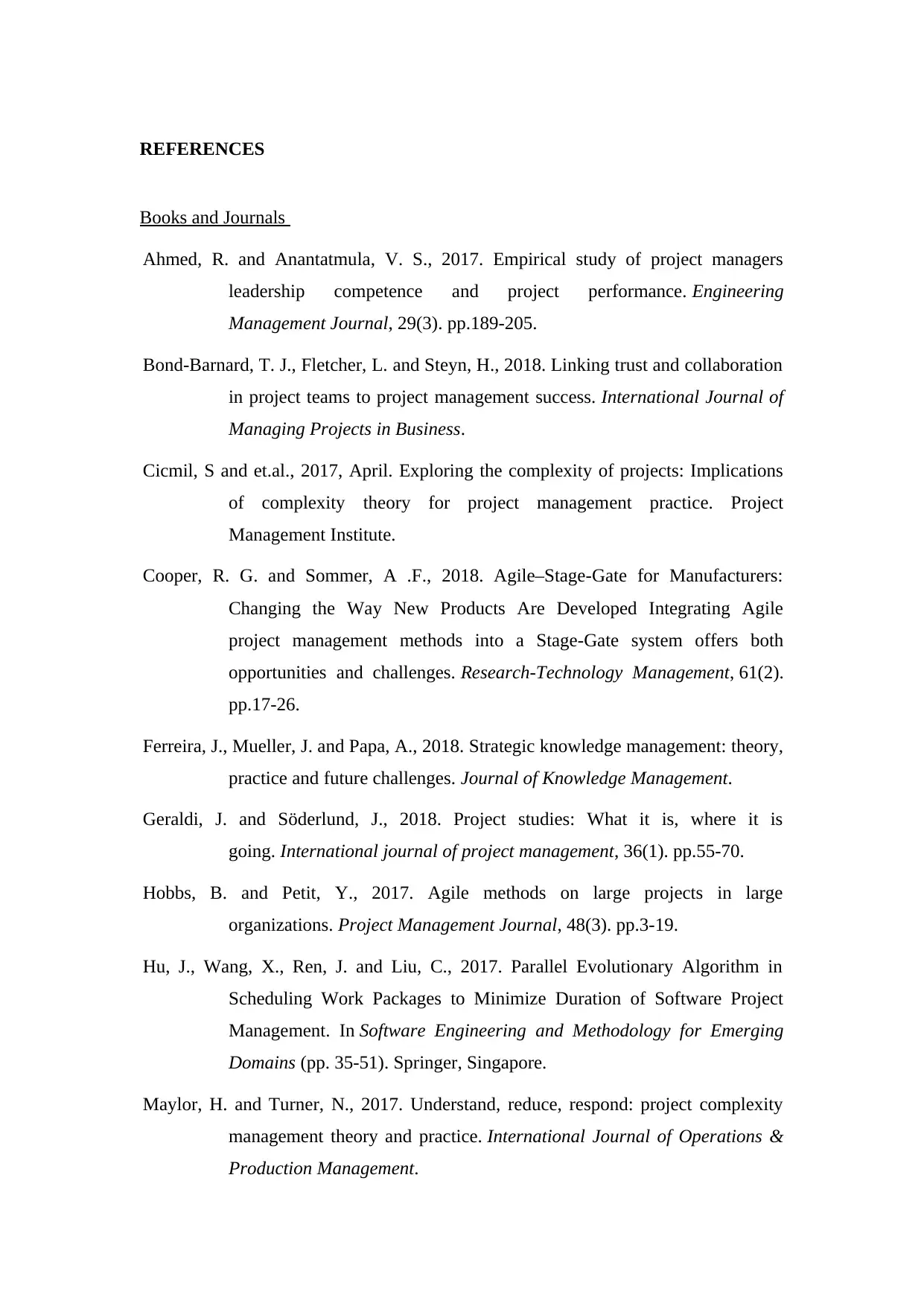
REFERENCES
Books and Journals
Ahmed, R. and Anantatmula, V. S., 2017. Empirical study of project managers
leadership competence and project performance. Engineering
Management Journal, 29(3). pp.189-205.
Bond-Barnard, T. J., Fletcher, L. and Steyn, H., 2018. Linking trust and collaboration
in project teams to project management success. International Journal of
Managing Projects in Business.
Cicmil, S and et.al., 2017, April. Exploring the complexity of projects: Implications
of complexity theory for project management practice. Project
Management Institute.
Cooper, R. G. and Sommer, A .F., 2018. Agile–Stage-Gate for Manufacturers:
Changing the Way New Products Are Developed Integrating Agile
project management methods into a Stage-Gate system offers both
opportunities and challenges. Research-Technology Management, 61(2).
pp.17-26.
Ferreira, J., Mueller, J. and Papa, A., 2018. Strategic knowledge management: theory,
practice and future challenges. Journal of Knowledge Management.
Geraldi, J. and Söderlund, J., 2018. Project studies: What it is, where it is
going. International journal of project management, 36(1). pp.55-70.
Hobbs, B. and Petit, Y., 2017. Agile methods on large projects in large
organizations. Project Management Journal, 48(3). pp.3-19.
Hu, J., Wang, X., Ren, J. and Liu, C., 2017. Parallel Evolutionary Algorithm in
Scheduling Work Packages to Minimize Duration of Software Project
Management. In Software Engineering and Methodology for Emerging
Domains (pp. 35-51). Springer, Singapore.
Maylor, H. and Turner, N., 2017. Understand, reduce, respond: project complexity
management theory and practice. International Journal of Operations &
Production Management.
Books and Journals
Ahmed, R. and Anantatmula, V. S., 2017. Empirical study of project managers
leadership competence and project performance. Engineering
Management Journal, 29(3). pp.189-205.
Bond-Barnard, T. J., Fletcher, L. and Steyn, H., 2018. Linking trust and collaboration
in project teams to project management success. International Journal of
Managing Projects in Business.
Cicmil, S and et.al., 2017, April. Exploring the complexity of projects: Implications
of complexity theory for project management practice. Project
Management Institute.
Cooper, R. G. and Sommer, A .F., 2018. Agile–Stage-Gate for Manufacturers:
Changing the Way New Products Are Developed Integrating Agile
project management methods into a Stage-Gate system offers both
opportunities and challenges. Research-Technology Management, 61(2).
pp.17-26.
Ferreira, J., Mueller, J. and Papa, A., 2018. Strategic knowledge management: theory,
practice and future challenges. Journal of Knowledge Management.
Geraldi, J. and Söderlund, J., 2018. Project studies: What it is, where it is
going. International journal of project management, 36(1). pp.55-70.
Hobbs, B. and Petit, Y., 2017. Agile methods on large projects in large
organizations. Project Management Journal, 48(3). pp.3-19.
Hu, J., Wang, X., Ren, J. and Liu, C., 2017. Parallel Evolutionary Algorithm in
Scheduling Work Packages to Minimize Duration of Software Project
Management. In Software Engineering and Methodology for Emerging
Domains (pp. 35-51). Springer, Singapore.
Maylor, H. and Turner, N., 2017. Understand, reduce, respond: project complexity
management theory and practice. International Journal of Operations &
Production Management.
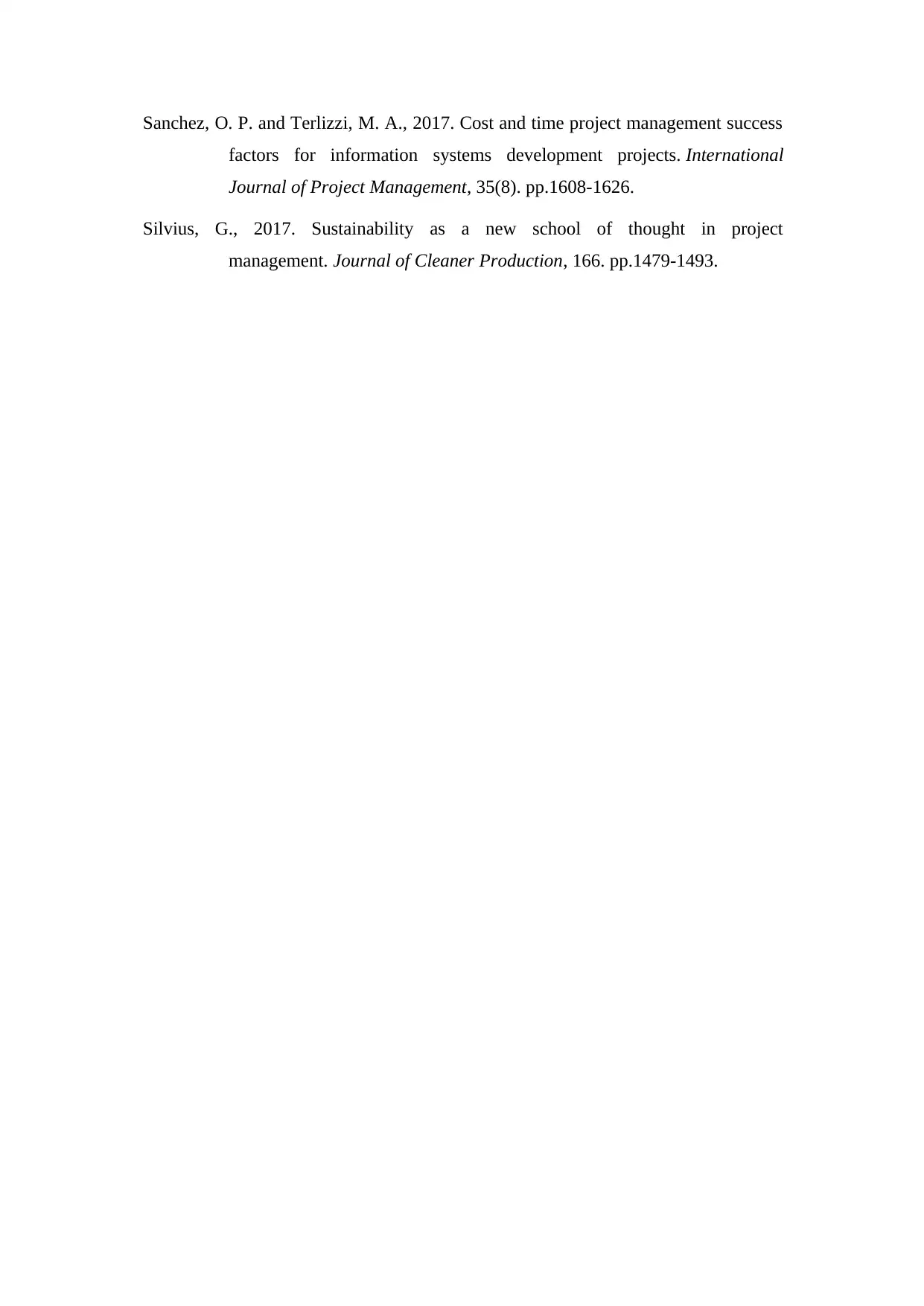
Sanchez, O. P. and Terlizzi, M. A., 2017. Cost and time project management success
factors for information systems development projects. International
Journal of Project Management, 35(8). pp.1608-1626.
Silvius, G., 2017. Sustainability as a new school of thought in project
management. Journal of Cleaner Production, 166. pp.1479-1493.
factors for information systems development projects. International
Journal of Project Management, 35(8). pp.1608-1626.
Silvius, G., 2017. Sustainability as a new school of thought in project
management. Journal of Cleaner Production, 166. pp.1479-1493.
⊘ This is a preview!⊘
Do you want full access?
Subscribe today to unlock all pages.

Trusted by 1+ million students worldwide
1 out of 12
Related Documents
Your All-in-One AI-Powered Toolkit for Academic Success.
+13062052269
info@desklib.com
Available 24*7 on WhatsApp / Email
![[object Object]](/_next/static/media/star-bottom.7253800d.svg)
Unlock your academic potential
Copyright © 2020–2026 A2Z Services. All Rights Reserved. Developed and managed by ZUCOL.



